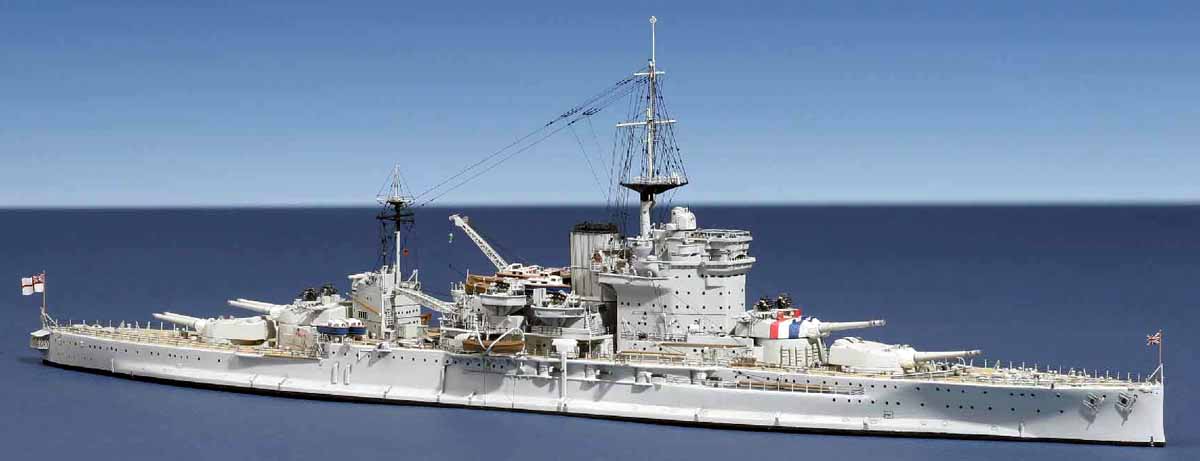by Dr. György Pék

1/600 HMS Warspite (Airfix)

| From 2000 to 2003 I have been trying to construct an 1:600 scale Airfix
model of this favourite warship of mine. The pictures show you the result.
Comprehensive upgrading is essential to achieve a look somewhat resembling
the original which I have chosen to be of 1937 vintage, directly after
the reconstruction. During my work I took maximum use of the great photoetch
upgrade set provided by White
Ensign Models. Thanks a lot Caroline!
The basic outline of the hull is correct although its shape had to be modified extensively to have a more sharp bow and stern. The original bulge was altered to gain a more rectangular shape. This was accomplished glueing a stripe if aluminium sheet to the original bulge then using two-component putty to flatten out the upper portion. Into this surface dozens of explosion vents were engraved. The sternwalk was built up using the WEM photoetch parts. Hundreds of small details were added to the hull sides and decks including 116 mushroom vents, fairleads, bollards, numerous hatches of various styles, cable drums from the GMM stock, breakwaters, etc. All scuttles have been drilled out.The ground tackle is completely scratchbuilt with the original structures being removed from the fo'c's'le deck. The ship's name is composed of tiny individual letters taken from older GMM sets and glued to their place one by one. The bridge parts from the signal deck upwards were discarded having
been replaced by more accurate scratchbuilt items. Of interest might be
the wind deflectors made of thin metal sheet and the admiral's bridge windows
which you can actually see through. The communications tubing and the anti-aircraft
lookout posts are well visible along with the compass and other bridge
fittings.The hangar saw its decks and bulwarks thinned or replaced, the
funnel was embellished with photoetch searchlight and siren platforms.
The air intake in the after superstructure was hollowed out and imitation
of canvas-covered railing was attached on top.
|
| The ship's masts were fashioned out of lenghts of steel rods ( injection
needle) using the photoetched starfish. The searchlights are built around
cylinders of transparent stretched sprue, painted silver ( a layer, which
was naturally painted over ) giving a glass-like appearance with some depth.
The boats were made of the original ones ( partly using cast replicas of
the more accurate whalers and gig belonging to the Repulse kit) embellished
using the WEM boat parts. The fast motor boats have hollowed-out cabins,
drilled-out windows and grab rails made of photoetch railing. Some of them
even have wheels. The cranes were upgraded with photoetch booms, scratchbuilt
bases and stretched sprue rigging. The carley floats boast bottoms of photoetch
grating. The main turrets have a refined form around the face plate with
a rectangular look. The turret roofs feature scratchbuilt gunsights, each
made of three pieces. Special care has been taken to sculpt real-looking
blast bags from putty. The casemate guns have cast resin cylinders ( the
master has been machined by a friend ) and injection needle barrels. The
4 inch turrets are WEM resin units with injection needle barrels and other
minor upgrade. The pom-pom battery is a combination of resin and photoetch
parts which seemed to be an optimal solution to combine correct shape platforms
and breech blocks with fine surface detail. With some scrathbuilt parts
added each pom-pom was made of 53 pieces. Somewhat refined Vickers quadruple
AA mounts with elaborate stands and saluting guns complement the armament.
The range-finders are partly upgraded original items whereas the 4in directors were decidedly left without canvas cover to allow visualisation of inner equipment. After I had realized that the planes supplied were Sharks, not Swordfish all I had to do was to add some detail like wing support struts, canopy frame, torpedo, etc. For railing and ladders I used WEM's state-of-the-art photoetch parts with railing support struts cut off and reattached where deemed appropriate. All railing is made of stretched sprue with Maskol insulators and helm indicator gear. |
| PAINTING:
In 1937 the Warspite was painted Med Fleet Grey. Preparing for Spanish Civil War neutrality patrol stripes were painted atop turret B. After a complete reconstruction the ship was in immaculate condition. These facts determined the painting process. Humbroll colours were used, H 147 for the ovarall colour, H 94 for the wooden deck. Steel decks were painted dark grey, rowing boats and booms middle brown with darker detail, while the motor boats have blue hull with light grey bottom, brown deck and white upperworks. Boot topping, funnel top, middle section of masts, scuttles, 6in, 4in and AA barrels plus rangefinder arms were painted black with a gunmetal colour ring at the muzzle. Come minor detail on boats and searchlights was painted brass colour. Regarding the ship's new condition only contrasting shades were applied, I omitted any kind of weathering. Flags came from the GMM set. Finally, a thin coat of matt varnish was sprayed all over the model. |
More of the Dr's Ships can be found in his Gallery Page